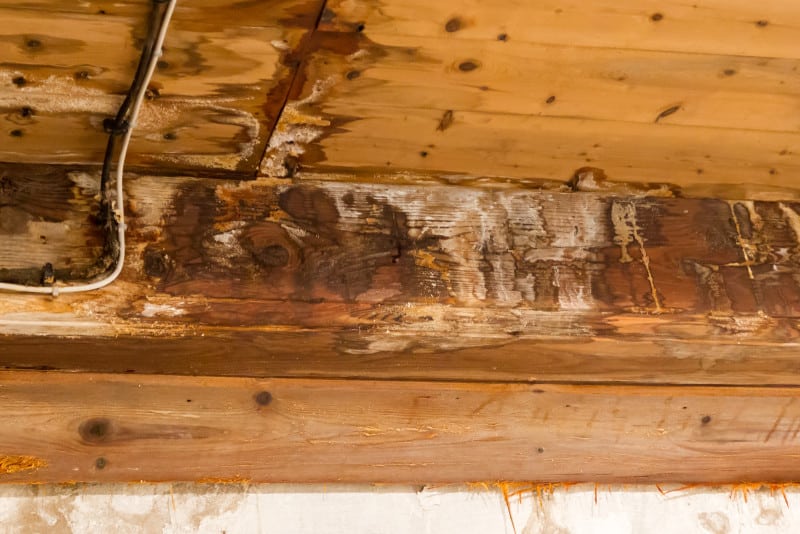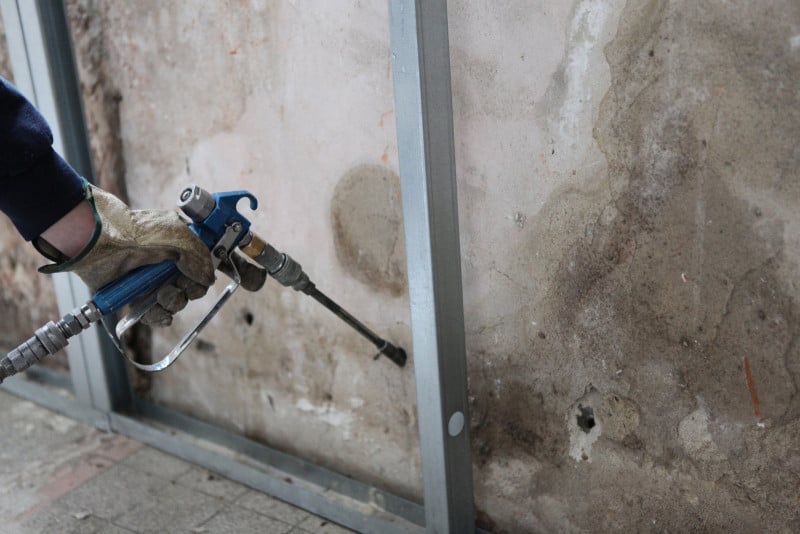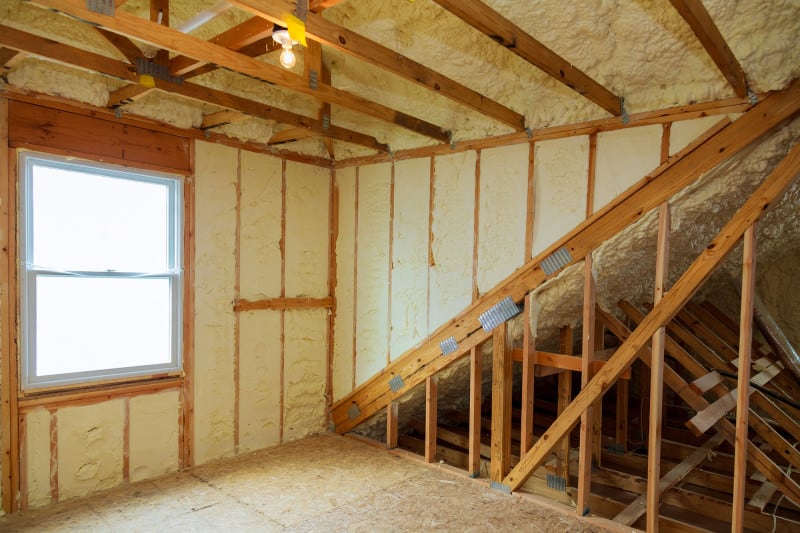Can Spray Foam Rot Your Roof?
If you’re considering using spray foam insulation, you may wonder if spray foam can rot your roof…
The short answer to this is ‘no’. Spray foam can’t rot your roof–in fact, spray foam insulation can actually help protect your roof from moisture damage and prevent rot.
Spray foam insulation is an increasingly popular way to insulate homes and buildings.
It’s easy to apply, relatively affordable and provides excellent energy efficiency.
Whether you’re considering adding spray foam insulation to your roof or already have it installed, this article will help you make informed decisions about its use and ensure long-term safety for your home.
Let’s dive in!
What Is Spray Foam Insulation?
Spray foam is a type of insulation that’s applied as a liquid and then expands to fill the space it’s been sprayed into.
It’s made up of two chemicals that are mixed together on-site and then sprayed onto the surface.
The foam expands and hardens quickly, creating a tight seal that helps prevent air leaks and provides excellent insulation.
There are two main types of spray foam insulation: open-cell and closed-cell.
Open-cell spray foam is less dense and more flexible, making it a good option for use in walls and ceilings.
Closed-cell spray foam is denser and more rigid, making it a good option for use in roofs and other areas that need extra structural support.
Spray foam insulation has become increasingly popular in recent years due to its energy efficiency and long lifespan.
It can also help prevent moisture buildup and protect against mold and mildew growth.
However, there are some potential downsides to using spray foam insulation, which we’ll explore in the next section.
Benefits of Spray Foam Insulation
When considering insulation for your home, spray foam is an option that often comes up.
But like any product, it has its pros and cons.
Let’s start with the pros.
Spray foam insulation is known for being incredibly effective at sealing up your home and keeping it warm in the winter and cool in the summer.
It can also help reduce noise pollution from outside, which is always a plus.
Plus, since it’s sprayed directly onto surfaces, it can get into all the nooks and crannies, providing a more complete seal than traditional insulation options.
It’s known to be quite durable, lasting for many years without needing to be replaced.
But with the pros comes the cons.
One of the biggest concerns with spray foam is that it can be quite expensive, especially when compared to other insulation options.
The installation process can be messier, as the foam needs to be sprayed directly onto surfaces, which can be time-consuming and require more preparation than other options.
There have been some concerns raised about potential health risks associated with spray foam insulation, specifically related to the off-gassing of certain chemicals used in the process.
So, what’s the verdict?
Ultimately, the decision to use spray foam insulation will depend on your specific needs, budget, and concerns.
It’s always a good idea to do your research and speak with a professional to determine if it’s the right choice for you and your home.
Potential Risks Of Spray Foam
While spray foam insulation can be an effective way to keep your home warm and save on energy costs, it’s not without its risks.
One of the main concerns with spray foam is the potential for improper installation, which can lead to a variety of problems down the line.
For example, if the foam is applied too thickly, it can put too much weight on your roof, which can cause structural damage over time.
If there are gaps in the insulation or if it’s applied unevenly, moisture can seep in and cause damage to your roof or other areas of your home.
Another potential risk is the use of certain chemicals during the installation process.
While spray foam insulation is generally considered safe, there have been concerns raised about the off-gassing of certain chemicals used in the process.
This can be a particular concern if you or someone in your household has respiratory issues or other health concerns.
That being said, it’s important to note that these risks can be mitigated if you choose a reputable and experienced professional to install your spray foam insulation.
They can ensure that the foam is applied correctly and that any potential health risks are minimized.
So, while there are potential risks associated with spray foam insulation, they can be managed with proper installation and careful consideration.
It’s always a good idea to do your research and speak with a professional to determine the best insulation option for your home and your specific needs.
Prevention Tips For Spray Foam
While spray foam insulation can be a great choice for your home, it’s important to take proper precautions to prevent any potential issues down the line. Here are a few tips to consider:
- Choose a reputable and experienced professional to install your spray foam insulation. This can help ensure that it’s applied correctly and that any potential issues are identified and addressed.
- Make sure that the insulation is applied evenly and without any gaps. This can help prevent moisture from seeping in and causing damage to your roof or other areas of your home.
- Ensure that the spray foam is not applied too thickly, as this can put too much weight on your roof and cause structural damage over time.
- Consider using a moisture barrier in addition to the spray foam insulation. This can help prevent any potential moisture issues from causing damage to your home.
- Finally, keep an eye out for any signs of potential issues, such as water spots, sagging in your roof structure, or cracks in your roof. If you notice any of these issues, it’s important to address them as soon as possible to prevent further damage.
By taking these prevention tips into consideration, you can enjoy the benefits of spray foam insulation without worrying about potential issues down the line.
As always, do your research and try to work with a professional to determine the best insulation option for your home and specific needs.
Conclusion
We know that spray foam insulation won’t rot your roof.
However, you should keep in mind that a poorly done installation job can lead to other problems that could eventually contribute to rot.
It’s important to understand the potential risks and make informed decisions when it comes to insulation for your home.
If they don’t apply the spray foam evenly or if there are gaps in the insulation where moisture can seep in, that moisture can cause damage to the roof over time.
But let’s be clear, these issues aren’t caused by the spray foam itself, but rather the installation process.
If done correctly, spray foam insulation can be a great choice for your home and won’t cause any harm to your roof.






